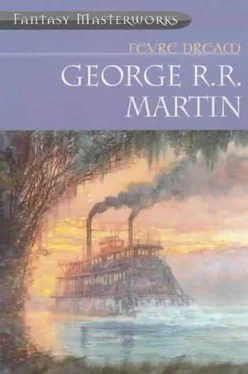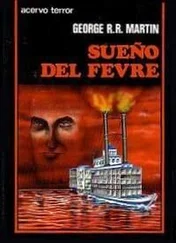George Martin - Fevre Dream
Здесь есть возможность читать онлайн «George Martin - Fevre Dream» весь текст электронной книги совершенно бесплатно (целиком полную версию без сокращений). В некоторых случаях можно слушать аудио, скачать через торрент в формате fb2 и присутствует краткое содержание. Жанр: Фэнтези, на английском языке. Описание произведения, (предисловие) а так же отзывы посетителей доступны на портале библиотеки ЛибКат.
- Название:Fevre Dream
- Автор:
- Жанр:
- Год:неизвестен
- ISBN:нет данных
- Рейтинг книги:4 / 5. Голосов: 1
-
Избранное:Добавить в избранное
- Отзывы:
-
Ваша оценка:
- 80
- 1
- 2
- 3
- 4
- 5
Fevre Dream: краткое содержание, описание и аннотация
Предлагаем к чтению аннотацию, описание, краткое содержание или предисловие (зависит от того, что написал сам автор книги «Fevre Dream»). Если вы не нашли необходимую информацию о книге — напишите в комментариях, мы постараемся отыскать её.
Fevre Dream — читать онлайн бесплатно полную книгу (весь текст) целиком
Ниже представлен текст книги, разбитый по страницам. Система сохранения места последней прочитанной страницы, позволяет с удобством читать онлайн бесплатно книгу «Fevre Dream», без необходимости каждый раз заново искать на чём Вы остановились. Поставьте закладку, и сможете в любой момент перейти на страницу, на которой закончили чтение.
Интервал:
Закладка:
Abner, of all that I heard and learned, that tale affected me most greatly. I doubt that any such vast underground city exists, doubt that it ever existed, but the very telling of such a story proved to me that my people were not the evil, empty vampires of legend. We had no art, no literature, not even a language of our own-but the story showed we had the capacity to dream, to imagine. We had never built, never created, only stolen your garments and lived in your cities and fed ourselves on your life, your vitality, your very blood-but we could create, given a chance, we had it within us to whisper stories of cities of our own. The red thirst has been a curse, has made my race and yours enemies, has robbed my people of all noble aspirations. The mark of Cain, indeed.
We have had our great leaders, Abner, bloodmasters real and imagined in ages past. We have had our Caesars, our Solomons, our Prester Johns. But we are waiting for our deliverer, you see, waiting for our Christ.
Huddled in the ruins of that grim castle, listening to the wind howl outside, Simon and the others drank my liquor and told me stories and studied me from potent, feverish eyes, and I realized what they must think. Each of them was hundreds of years older than I, but I was the stronger, I was bloodmaster. I brought them an elixir that banished the red thirst. I seemed almost half-human. Abner, they saw me as the deliverer of legend, the promised king of the vampires. And I could not deny it. It was my destiny, I knew then, to lead my race from darkness.
There are so many things I want to do, Abner, so many things. Your own people are fearful and superstitious and full of hate, so my kind must stay hidden for now. I have seen the way you war on each other, read of Vlad Tepes-who was not one of us, by the way-of him and Gaius Caligula and other kings, I have seen your race burn old women because they were suspected of being one of us, and here in New Orleans I have witnessed the way you enslave your own kind, whip them and sell them like animals simply because of the darkness of their skin. The black people are closer to you, more kin, than ever my kind can be. You can even get children on their women, while no such interbreeding is possible between night and day. No, we must remain hidden from your people, for our safety. But, free from the red thirst, I hope in time we can reveal ourselves to the enlightened among you, men of science and learning, your leaders. We can help each other so much, Abner! We can teach you your own histories, and from us you may learn how to heal yourselves, how to live longer. For our part, we have only just begun. I have defeated the red thirst, and with help I dream some day of conquering the very sun, so we can go abroad by day. Your surgeons and men of medicine could help our females in childbirth, so procreation need not mean death.
There is no limit to what my race can create and accomplish. I realized then, listening to Simon, that I could make us one of the great peoples of the earth. But first I had to find my race, before any of it could begin.
The task was not easy. Simon said that in his youth there had been almost a thousand of us, scattered over Europe from the Urals to Britain. Legend said some of us had migrated south to Africa or east to Mongolia and Cathay, but no one had any proof of such treks. Of the thousand who had dwelled in Europe, most had died in wars or witch trials, or had been hunted down when they grew careless. Perhaps a hundred of us were left, Simon guessed, perhaps fewer. Births had been few. And those who did survive were scattered and hidden.
So we began a search that took a decade. I will not bore you with all the details. In a church in Russia, we found those books you saw in my cabin, the only literature known to have come from the hand of one of my race. I deciphered them in time, and read the melancholy story of a community of fifty of the people of the blood, their woes and migrations and battles, their deaths. They were all gone, the last three crucified and burned centuries before my birth. In Transylvania we found the burnt-out shell of a mountain fastness, and in caves beneath, the skeletal remains of two of my race, rotten wooden stakes protruding from their ribs, skulls mounted on poles. I learned a good deal from study of those bones, but we had no living survivors. In Trieste we found a family that never went out by day, and were whispered to be strangely pale. Indeed they were. Albinos. In Buda-Pest we came upon a rich woman, a dreadful sick woman who whipped her maids and bled them with leeches and knives, and rubbed the blood into her skin to preserve her beauty. She was one of you, however. I confess, I killed her with my own hands, so sick at heart did she make me. She was under no compulsion from the thirst; only an evil nature made her do as she did, and that made me furious. Finally, finding nothing, we returned to my home in Scotland.
Years passed. The woman in our group, Simon’s companion and the servant of my childhood, died in 1840, of causes I was never able to determine. She was less than five hundred years old. I dissected her, and learned how very different, how very inhuman, we are. She had at least three organs I have never seen in human cadavers. I have only a vague idea of their function. Her heart was half again the size of a human heart, but her intestines were a mere fraction of the length, and she had a secondary stomach-I think solely for the digestion of blood. And more, but that is of no matter.
I read widely, learned other languages, wrote some poetry, dabbled in politics. We attended all the best society gatherings, Simon and I at least. Smith and Brown, as you call them, never did show much interest in English, and kept to themselves. Twice Simon and I went to the continent together on new searches. Once I sent him to India for three years, alone.
Finally, barely two years ago, we found Katherine, living in London, right under our noses. She was of our race, of course. But more important was the story she told.
She said that around 1750, a sizeable group of our people had been scattered over France and Bavaria and Austria and even Italy. She mentioned some names; Simon recognized them. We had searched for these people unsuccessfully for years. Katherine told us that one of their number had been tracked and killed by police in Munich in 1753 or so, that the others had grown very frightened. Their bloodmaster decided that Europe had become too populated, too organized for safety. We lived in the cracks and shadows, and those were fewer and fewer, it seemed. So he had chartered a ship, and all of them had departed from Lisbon, bound for the New World, where the savagery and endless forests and rude colonial conditions promised easy prey and safety. Why my father and his group had not been included in the migration she could not say. She was to go with them, but rains and storms and a broken carriage wheel plagued her trip to Lisbon, and when she arrived they had departed.
Of course I went at once to Lisbon, and pored through whatever old shipping records the Portugese had preserved. In time, I found it. The ship had never returned from its charter, as I had suspected. At sea for all that time, they would have had no choice but to feed on the crew, one by one. The question was, had the ship ever arrived safely in the New World? I could find no record of it. But I did find the intended destination; the port of New Orleans. From there, via the Mississippi, the whole continent would be open to them.
The rest should be obvious. We came. I felt certain I would find them. It seemed to me that by having a steamboat I would enjoy the luxury I have grown accustomed to, and the mobility and freedom I needed for my search. The river was full of eccentrics. A few more would not be noticed. And if tales of our fabulous boat and the strange captain who only came out by night spread up and down the river, so much the better. The tales might come to the right ears, and they would come to me as Simon did so many years ago. So I made inquiries, and we met one night in St. Louis.
Читать дальшеИнтервал:
Закладка:
Похожие книги на «Fevre Dream»
Представляем Вашему вниманию похожие книги на «Fevre Dream» списком для выбора. Мы отобрали схожую по названию и смыслу литературу в надежде предоставить читателям больше вариантов отыскать новые, интересные, ещё непрочитанные произведения.
Обсуждение, отзывы о книге «Fevre Dream» и просто собственные мнения читателей. Оставьте ваши комментарии, напишите, что Вы думаете о произведении, его смысле или главных героях. Укажите что конкретно понравилось, а что нет, и почему Вы так считаете.












